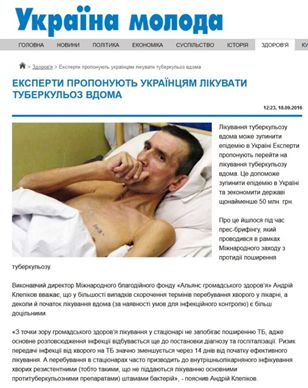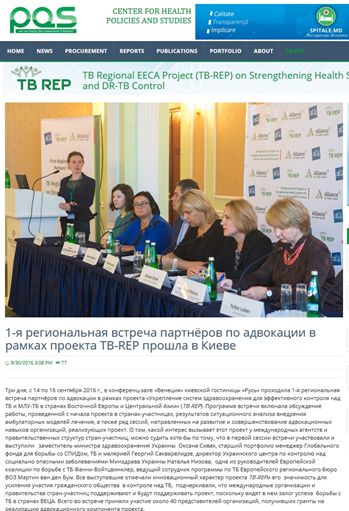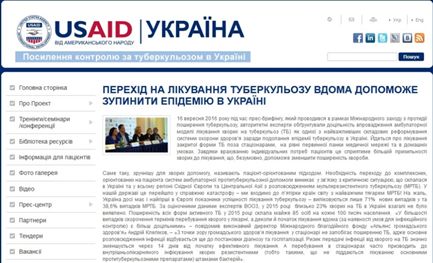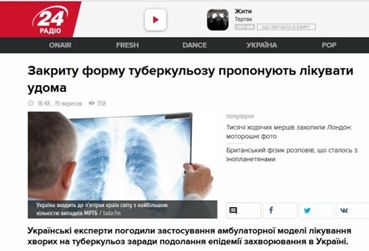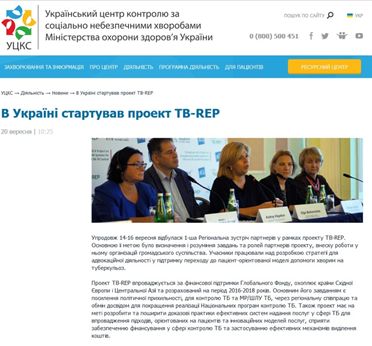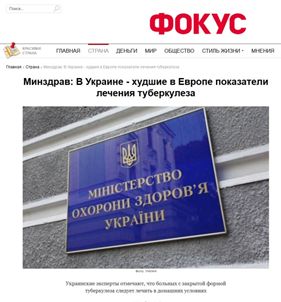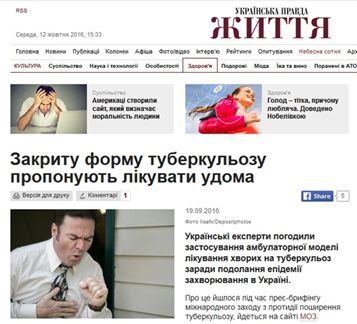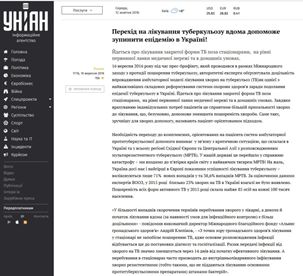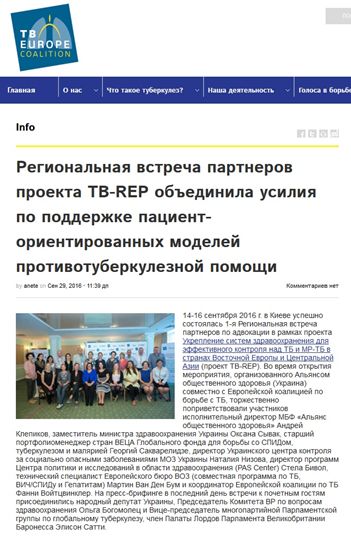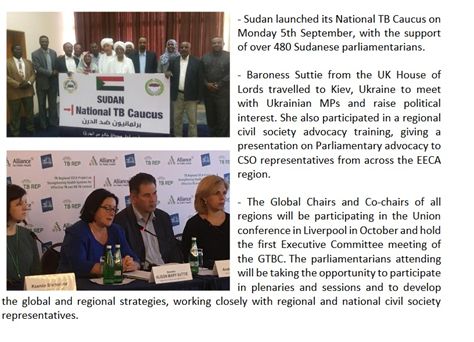TB in Eastern Europe and Central Asia Project on Strengthening Health Systems for Effective TB and DR-TB Control

TB in Eastern Europe and Central Asia Project on Strengthening Health Systems for Effective TB and DR-TB Control
Regional project: TB in Eastern Europe and Central Asia Project on Strengthening Health Systems for Effective TB and DR-TB Control.
The Project is implemented with the financial support of the Global Fund to Fight AIDS, Tuberculosis and Malaria (hereinafter – GF) in the countries of Eastern Europe and Central Asia (hereinafter – EECA).
Period of project implementation: 2016 – 2018.
Overall goal of the Project is to decrease the burden of tuberculosis disease and halt the spread of drug resistance in target EECA countries through increasing political commitment and translating evidence into implementation of patient-centered TB models of care.
Project objectives:
- To increase political commitment to end TB and MDR/XDR-TB through regional cooperation and evidence sharing for better governance of the National TB Control Programs.
- To develop and disseminate evidence on effective TB services delivery systems for implementation of the patient-centered approaches and innovative models of care.
- To ensure sustainable financing in TB Control and efficient funds allocation mechanisms.
With technical leadership of WHO Regional Office for Europe, the Principal Recipient of the GF grant to implement the Project is the Center for Health Policies and Studies (hereinafter – PAS Center, Republic of Moldova). Besides, a wide range of partners is involved into project implementation, including TB Europe
Coalition, on whose behalf ICF “Alliance of Public Health” acts, the European Respiratory Society, other academic and service institutions of the region.
One of the Project components is support of the activities of civil society organizations (hereinafter – CSOs) in TB advocacy. To achieve this objective, in November 2015 a call for proposals “Establishing sustained advocacy for transition to the outpatient model of health care for the key groups of population affected by TB” was announced. Based on the competition results, ten winning bidders were defined for organizations representing EECA countries (Republic of Azerbaijan, Republic of Armenia, Republic of Belarus, Georgia, Republic of Kazakhstan, Kyrgyz Republic, Republic of Moldova, Republic of Uzbekistan, Ukraine, and Republic of Tajikistan). In 2017, the representatives of Turkmenistan has also joined the project.
Within the performance of project proposals, CSOs in partnership with the wide range of stakeholders in the relevant countries should develop advocacy strategies aimed at the support of efficient and cost-effective outpatient model of health care for TB patients.
ICF “Alliance of Public Health”, which acts in cooperation with TB Europe Coalition for the Project implementation, is responsible for providing general technical support to CSO projects, coordination of advocacy activities, monitoring and exchange of best advocacy practices in EECA region.
Center For Health Policies and Studies
WHO Europe webpage on “Health system response to tuberculosis”.
With support of Alliance the Parliament Platform to Fight Tuberculosis Established at Ukraine
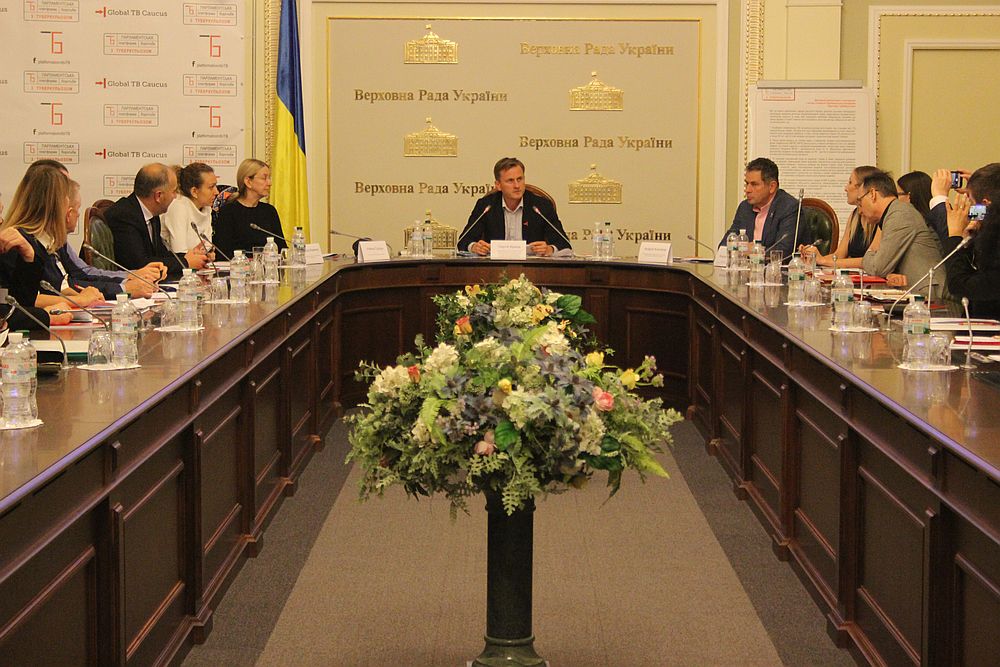
On October 3, 2017 in Verkhovna Rada of Ukraine, an interfactional platform of Parliamentarians was established to consolidate efforts to fight longstanding epidemic of tuberculosis (TB) in Ukraine. Members of Parliament representing different factions and committees willing to contribute to end the disease in our country joined the Parliament Platform to Fight Tuberculosis.
For over a year, the Alliance of Public Health, which is the focal point of the civil society organizations for working with the Global TB Caucus in our country, and the international movement of parliamentarians Global TB Caucus, contributed to the development of the deputy initiative in Ukraine and its setting in the interfractional parliamentary association to fight against TB. As a result of this activity, on October 3, 2017, the Speaker of the Verkhovna Rada announced the official creation of the Parliament Platform to Fight Tuberculosis.
“We united regardless of party affiliation or political views. Within the framework of the Parliament Platform to Fight Tuberculosis, beside legislative resolution of issues concerning elimination of TB, our goal is to effectively cooperate with all related authorities, listen to the needs of the patients, ensure sustainable budget to fight the disease, collaborate with the civil society and parliaments of other countries. That is, to be the center of partnership and joint efforts. A special task of the Parliament Platform is to promote the rights of people affected by TB and overcome discrimination and stigma toward the patients and their families”” —noted during the Round Table on Establishing the Parliament Platform Mr. Serhiy Kiral, Member of Parliament of Ukraine, PACE Reporter on antimicrobial resistance and tuberculosis in Europe.
Participation in the event was attended by peoples’ deputies of Ukraine,, delegates of key international organizations, leaders of respective authorities, representatives of civic society, patients, and people affected by TB. At the beginning of the Round Table Olha Klimenko, a former patient and author of the book “The World in Me. Confessions of Tuberculosis Patient”, told the participants of the event about importance of supporting patients during treatment and considering their needs, based on her own experience: “A patient with any diagnosis is, first of all, a human being in need of help and support. It is important for people receiving treatment to be able to count on all the human and professional support to complete it successfully. We have a goal: to introduce outpatient treatment models in our country. For patients, provided medical indications are positive, to be able to choose whether they get treatment in the TB dispensary or at home, with regular visits and support provided by a social worker”.
Acting Minister of Health of Ukraine stated: “We have the money, we have the medicines, we have new treatment protocols. Our task now is to change the system to serve to the needs of the patients, and not its own needs. We have to make quality diagnostics and effective treatment accessible to people.”
Andriy Klepikov, Executive Director of International Charitable Foundation “Alliance for Public Health” informed regarding the need to switch to comprehensive people-centered systems of outpatient TB care that arises out of the critical situation in Ukraine and throughout Eastern Europe and Central Asia (EECA) region especially with the burden of multi-drug resistant tuberculosis (MDR-TB). He noted that our country is among the countries with the greatest burden of MRTB and that this form of the disease is diagnosed in every second patient with recurrent case of the disease, and in one of every four new cases. “Civil society organizations have proven to be key players in provision of quality and people-oriented TB care. In particular, combining medical, social and psychological support allowed doubling the success rate of MDR-TB treatment! About 80% of patients with MDR-TB were cured! This is a really impressive result, considering that on average in Ukraine, the success rate for such patients is as low as 42%.” — stated Andriy Klepikov – “In view of future switching from donor support to domestic budget sources, it is important to ensure sustainability of funding of effective approaches to detecting and treating tuberculosis. Availability of budget funds and mechanisms for social contracting of services is the foundation of the sustainability of Ukraine’s response to epidemic of tuberculosis.”
Congratulations of the initiative to create a Parliamentary Platform on behalf of the Global TB Caucus announced Rosanna Flury, EECA Regional Director of Global TB Caucus. She noticed that today Caucus has already united more than 2,400 parliamentarians from 132 countries of the world. Due to the political will and support that can be provided by members of the Parliament Platform to Fight Tuberculosis as representatives of the main legislature of the state will enable achieving sustainable outcomes, approving respective budgets and rendering significant public influence required to overcome stigma and raise the awareness of Ukrainians about the disease. Rosanna Flury also stated that “Global political actions are crucial to draw the attention to the problem of tuberculosis, a disease that kills more people than any other infection. We are approaching an important moment in fighting TB — the 2018 UN High-Level Meeting on TB. Ukraine will play an important part in fighting TB in Eastern Europe and Central Asia, as well as on the global level. Global TB Caucus welcomes establishing the Ukrainian Parliamentary Platform.”
The Alliance is confident that the Parliamentary Platform is waited for the fruitful cooperation with the executive authorities, international organizations and civil society. It is very important today to combine all the efforts and key components of the response to the TB problem, in particular, within the framework of the regional TB-REP project, which Ukraine is a participate in.
Follow the official Facebook page at www.facebook.com/platformaborotbiTB for specific steps of the Parliament Platform to Fight Tuberculosis.
Video recording of the Round Table can be viewed at http://newsvideo.su/video/7664241
Video recording of the press briefing on the establishment of the Parliament Platform to Fight Tuberculosis can be found at http://newsvideo.su/video/7664241
Cornerstone decisions about the future of the TB Europe Coalition (hereinafter – TBEC) were made last week in Kyiv.

On 9-10 February 2017, Alliance had an honor to host Steering Committee strategic meeting of the TB Europe Coalition. Its participants included members of the TBEC Steering Committee, among them – civil society organizations – implementing partners of the TB-REP project and members of TBEC Secretariats – Global Health Advocates (Brussels), Results UK (London), and Alliance for Public Health (Ukraine). Welcoming speeches were delivered by Andriy Klepikov, Executive Director of Alliance for Public Health and member of the TBEC Steering Committee and by Fanny Voitzwinkler, Head of the Brussels Office of the Global Health Advocates.
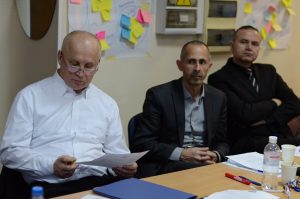 The meeting was convened due to a new turn in the development of TBEC as well as new challenges and opportunities in TB response, which call for strategic decisions. The Coalition was founded in 2009 and over the years became a dynamic network of civil society organizations and activists, who join their efforts to end the epidemic of tuberculosis in Eastern Europe and Central Asia (hereinafter – EECA). TBEC develops joint initiatives with TB People, which is the first network of people with experience of TB in EECA, and the Global TB Caucus, an international movement that brings together over 1,500 parliamentarians from 130 countries of the world committed to the fight against TB.
The meeting was convened due to a new turn in the development of TBEC as well as new challenges and opportunities in TB response, which call for strategic decisions. The Coalition was founded in 2009 and over the years became a dynamic network of civil society organizations and activists, who join their efforts to end the epidemic of tuberculosis in Eastern Europe and Central Asia (hereinafter – EECA). TBEC develops joint initiatives with TB People, which is the first network of people with experience of TB in EECA, and the Global TB Caucus, an international movement that brings together over 1,500 parliamentarians from 130 countries of the world committed to the fight against TB.
A very important partnership for TBEC is its participation in the TB-REP project – the first regional project in the area of TB implemented in 11 EECA countries supported by the Global Fund to Fight AIDS, Tuberculosis and Malaria (hereinafter – GF) with a component of civil society network engagement. The principal recipient of the GF grant is the Center for Health Policies and Studies (PAS Center, Moldova). TBEC together with Alliance are responsible for the support of civil society organizations within the TB-REP project. The main task in this respect is to make sure that the experience of people who were or are sick with TB are taken into account when governments are making decisions to shape people-oriented TB care.
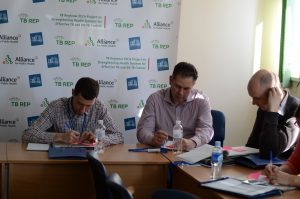 Members of the Steering Committee and Secretariats as well as partners invited to take part in the meeting in Kyiv during the strategic planning session formulated a joint TBEC vision “World Free of Tuberculosis” and a relevant mission “Civil Society driving the TB Response”!
Members of the Steering Committee and Secretariats as well as partners invited to take part in the meeting in Kyiv during the strategic planning session formulated a joint TBEC vision “World Free of Tuberculosis” and a relevant mission “Civil Society driving the TB Response”!
TBEC strategic goals for the nearest years include ensuring a strong and responsible civil society network in the area of TB response. It requires supporting the development of strategic partnerships and skills of
activists to impact the policy-making processes for effective response to TB. At the meeting, the following areas of TBEC activities up to 2020 were defined:
- Advocate for the transition to people-centered TB care,
- Participate in the transition processes to ensure sustainable response of countries to the TB epidemic after termination of the GF funding,
- Ensure access to the available TB drugs and diagnostic methods for all those who need it,
- Engage CSOs to monitoring and evaluation processes, in particular with regard to implementation of the national TB programs,
- Advocate for conducting research and developing new more effective drugs, vaccines and diagnostic methods.
Meeting participants agreed on the key priorities and further detailed steps required to achieve strategic development goals.
The Coordinating Group on Implementing Activities to Reform the Healthcare System in the Area of TB Response United All Stakeholders
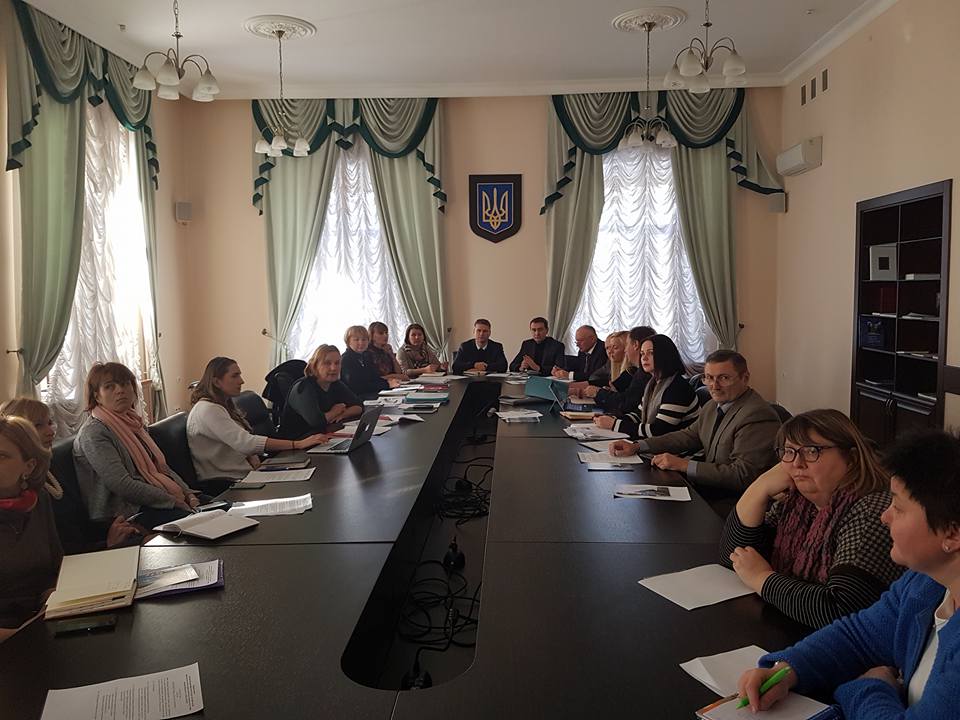
On 26 January 2017, the Ministry of Health of Ukraine hosted the first meeting of the Coordinating Group on Implementing Activities to Reform the Healthcare System in the Area of TB Response. This first session of the Coordinating Group chaired by the Deputy Minister of Health, Oksana Syvak, was attended by partners representing government and civil society as well as representatives of the WHO Regional Office for Europe and the Global Fund to Fight AIDS, Tuberculosis and Malaria. The Coordinating Group will include representatives of the Alliance: Sergiy Filippovych, Director: Treatment, Procurement and Supply Management and Yulia Chorna, Project Manager: TB Advocacy.
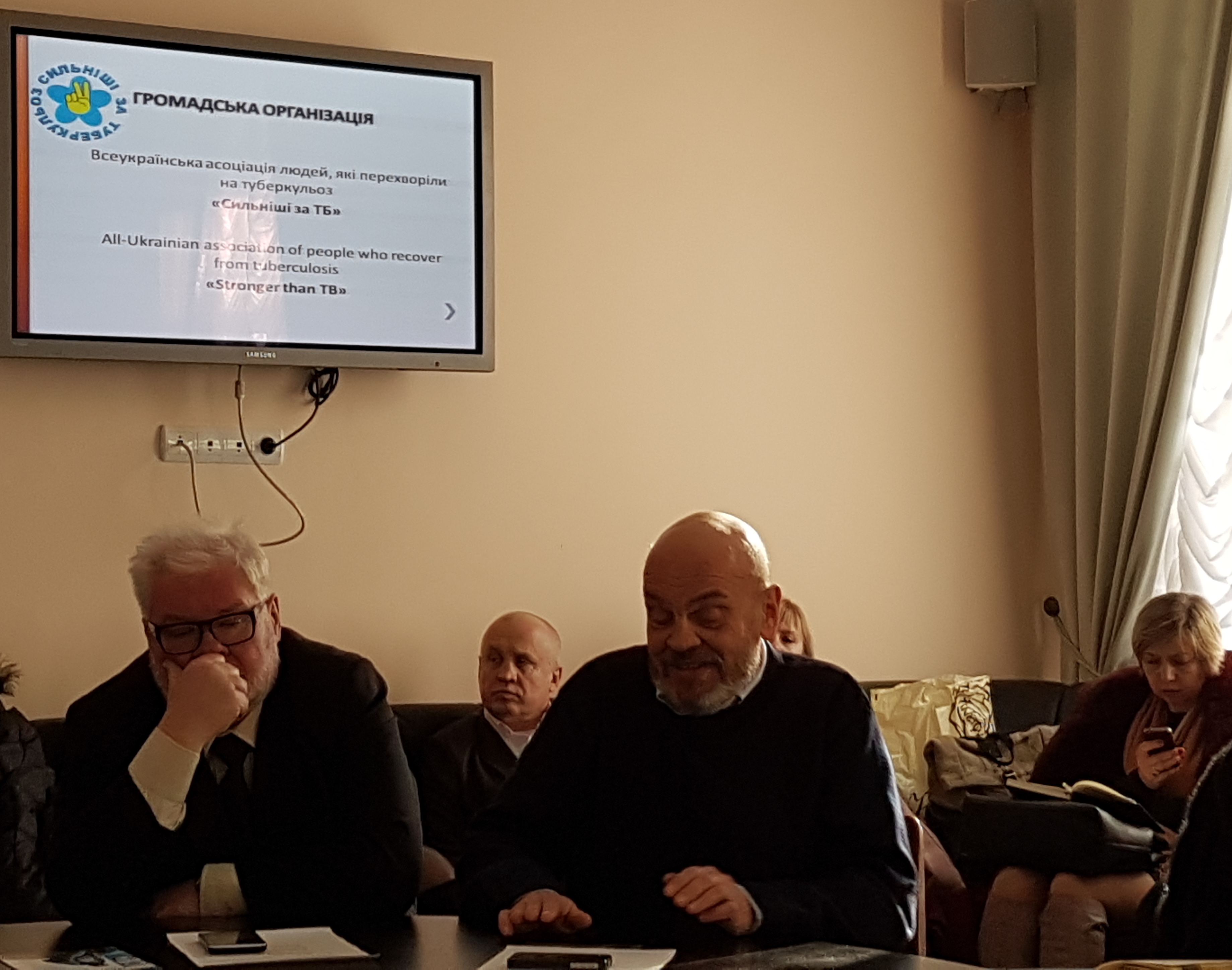 The group was created in order to elaborate and implement an action plan on the TB care reform in Ukraine. An important aspect of this reform is support of patient-oriented treatment of TB patients using outpatient care models. The specific objectives, which should be resolved by the government in the course of reforming the TB care, are related to capacity building and management of human resources as well as improving the effectiveness of funding in the delivery of TB care. The state, guided by the Ministry of Health, demonstrates its commitment to the reform by supporting the high-level national coordinating group.
The group was created in order to elaborate and implement an action plan on the TB care reform in Ukraine. An important aspect of this reform is support of patient-oriented treatment of TB patients using outpatient care models. The specific objectives, which should be resolved by the government in the course of reforming the TB care, are related to capacity building and management of human resources as well as improving the effectiveness of funding in the delivery of TB care. The state, guided by the Ministry of Health, demonstrates its commitment to the reform by supporting the high-level national coordinating group.
The priority in providing support to TB patients is a focus on outpatient services. New funding models will be implemented based on the results of activities in this area. As for the resulting resources, they will be reinvested to support TB response interventions at the outpatient stage. As part of the new model of health care for TB patients, the required mechanisms of social contracting will be developed to supply TB services, in particular in the context of working with key populations.
The national coordinating group was created within the regional TB-REP project (TB in Eastern Europe and Central Asia Project on Strengthening Health Systems for Effective TB and DR-TB Control), with Alliance for Public Health being partner of this Project on behalf of TB Europe Coalition. The project is aimed at reforming the TB care system as part of the general health care reforms and is implemented in 2016-2018 with financial support of the Global Fund in 11 countries of Eastern Europe and Central Asia (Armenia, Azerbaijan, Belarus, Georgia, Kazakhstan, Kyrgyzstan, Moldova, Tajikistan, Turkmenistan, Ukraine, and Uzbekistan). Principal Recipient of the Global Fund grant is the Center for Health Policies and Studies (PAS Center), with technical leadership of the WHO Regional Office for Europe.
The general goal of the project is to reduce the TB burden and to halt the spread of drug-resistant TB by ensuring political commitment and extensive use of evidence-based patient-oriented approaches in the delivery of TB prevention, care and treatment services. An important approach of the project is joining efforts at different levels – from the state to the civil society – to provide more effective TB care. TB Europe Coalition together with the Alliance for Public Health is responsible for the component of supporting advocacy efforts from the side of civil society organizations implementing the project in 11 countries. Civil society partner of the Project in Ukraine is CO “The Ukrainians against TB”. The main advocacy efforts of civil society organizations are aimed at supporting the transition to patient-oriented models of TB care with a focus on providing such care in outpatient settings.
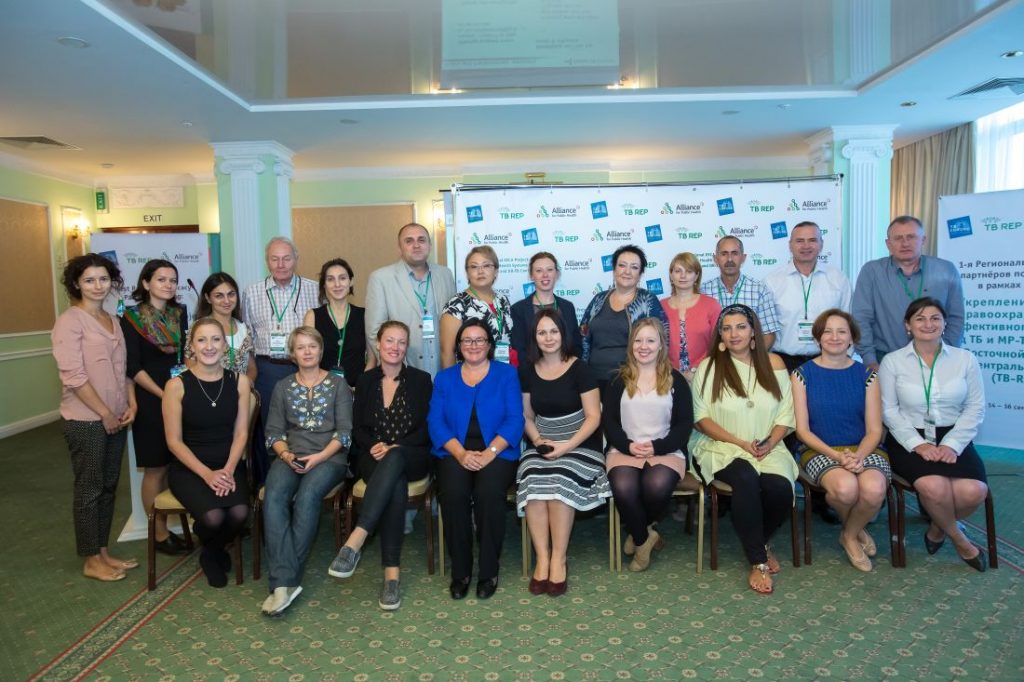
TB-REP partners joined efforts for TB advocacy
The regional meeting of TB-REP project partners joined their efforts to support patient-oriented models of TB care
On 14-16 September 2016, Kyiv hosted the first regional meeting of the advocacy partners within the TB in Eastern Europe and Central Asia Project on Strengthening Health Systems for Effective TB and DR-TB Control (TB-REP). At the opening ceremony of the event, organized by Alliance jointly with TB Europe Coalition, the participants were welcomed by Andriy Klepikov, Executive director of Alliance for Public Health; Oksana Syvak, the Deputy Minister of Health of Ukraine; George Sakvarelidze, Senior Fund Portfolio Manager, EECA Team, the Global Fund to Fight AIDS, Tuberculosis and Malaria; Natalia Nizova, Director of the Ukrainian Center for Socially Dangerous Disease Control of the Ministry of Health of Ukraine; Stela Bivol, Director of Programs, Center for Health Policies and Studies (PAS Center); Martin van den Boom, Technical Officer, Joint TB, HIV/AIDS and Hepatitis Program, WHO Regional Office for Europe and Fanny Voitzwinkler, Coordinator of the TB Europe Coalition. During the press briefing held on the last day of the meeting, our honored guests were joined by Olha Bohomolets, Member of the Ukrainian Parliament and Head of the Parliamentary Committee on Health and Baroness Alison Suttie, life peer in the UK House of Lords, member of the Global TB Caucus.
One of the most important outcomes of the meeting was coordination of the efforts of TB-REP project partners, in particular the WHO Regional Office for Europe, PAS Center, which is the primary recipient of the GF funding for TB-REP, TB Europe Coalition, Alliance for Public Health, civil society organizations in EECA countries and patients’ communities. Understanding the roles and the value of each of the partners and their complementarity defined the perspectives and the opportunities for cooperation in the grass-root and high-level advocacy to support patient-oriented models of TB care.
A detailed review of the TB-REP project (with Alliance being partner of the project on behalf of TB Europe Coalition) was made during the meeting. The participants looked at the objectives of project partners and various aspects of project implementation, learned about the history of TB Europe Coalition, its goals and successes at the various levels of advocacy activities and also became aware of the role of ambulatory care in achieving the best results in TB treatment in the WHO European region. Following the presentations, the participants discussed the issue of development of a WHO Blueprint, which, reflecting the unique nature of each of the countries of the region is at the same time, a unique tool and a guide to TB care system reforms.
Besides, the advocacy partners made a detailed analysis of the results of situation assessment in terms of transition to ambulatory TB care models, the draft advocacy strategies developed by partners in their countries, effective advocacy messages, the questions of budget advocacy as well as building coalitions, scaling up partnerships and involving patients and communities in the advocacy activities. In conclusion, participants of the meeting learned about the activities of the Global TB Caucus and Eurasian Parliamentary Groups as well as about the basics of interaction with Members of Parliaments and decision makers.
Regional partners of the TB-REP projects pointed out that participation in this meeting allowed them to acquire knowledge and skills required to implement effective advocacy activities. They underlined the significance of getting acquainted with the concept of the WHO Blueprint to guide the TB care reforms, approaches to budget advocacy and to develop skills in working with Members of Parliaments and the Global TB Caucus, which brings together Parliamentarians from all over the world to eliminate TB.
First regional stakeholder meeting on advocacy within the TB-REP project was organized by the Alliance for Public Health on behalf of the TB Europe Coalition and enabled to widely highlight the transition to outpatient TB treatment models, raise public awareness about the implementation of the TB-REP project (PAS Center being the principal recipient of the GF funding) in Ukraine and the EECA region, as well as about the operation of the Global TB Caucus. More than three dozens of the media and different information resources have disclosed the advantages of transitioning to the comprehensive, patient-oriented TB service delivery and reasoning behind the feasibility of outpatient model implementation for TB patients as one of the key components of healthcare system reform aimed to overcome TB epidemic. Media publications continue due to the active public response.
Introduction of home-based treatment of the TB will help to stop epidemic in Ukraine
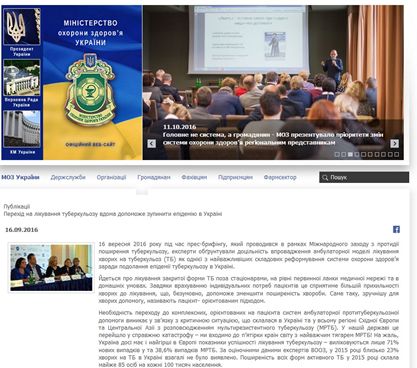
On September 16, 2016 during the press briefing carried out within the framework of the International TB Response meeting, the experts discussed the feasibility of implementing the outpatient treatment model for TB patients as one of the key components of healthcare system reform in order to overcome the TB epidemic in Ukraine.
“During the last several years the Alliance implemented a number of innovations in TB diagnostics and treatment. The equipment supplied in all the regions of Ukraine allowed to get to know one’s diagnosis in 15 minutes (instead of two weeks as it used to be), and high quality medicines procured by the Alliance at the expense of the Global Fund, as well as efficiently organized social support of the patients increased the positive outcome of MDR-TB patients treatment to 85% (as compared to the nationwide indicator of 38.6%)”, – Andriy Klepikov added.
The experts suggest that the Ukrainians should take TB treatment at home
TB treatment at home can curb the TB epidemic in Ukraine. The experts suggest to implement the home-based TB treatment. This will help to stop the epidemic in Ukraine and save at least UAH 50 million of the state funds.
This was the topic of the press briefing carried out during the International meeting.
Andriy Klepikov, Executive Director of the International Charitable Foundation “Alliance for Public Health” considers that in most cases the decrease of the patient’s stay in the hospital, and even home-based treatment initiation (provided that the infection control conditions are available) is more feasible.
1-st regional advocacy stakeholder meeting within TB-REP project was carried out in Kyiv
Three days, from September 14 to 16, 2016 in the “Venice” conference hall of the Rus hotel the first regional advocacy stakeholder meeting was carried out within the TB-REP project. The agenda of the meeting included the discussion of the work carried out in participating countries since the project start, outcomes of the situational analysis of the outpatient treatment models implementation in the countries, as well as the number of the sessions aimed at development and improvement of the advocacy skills of the implementing organizations. The intense interest of the international agencies and governmental authorities of participating countries in the project is proven by the fact that the following top speakers participated at took floor in the meeting: Deputy Minister of Health of Ukraine Oksana Syvak, Senior GFATM Portfolio Manager George Sakvarelidze, Director of the Ukrainian Center for Socially Dangerous Diseases Control Nataliia Nizova, one of the leaders of the European TB Coalition Fanny Voitzwinkler, key TB technical officer of the WHO Europe Martin van den Boom. Practical advices on working with Members of Parliaments from Baroness Suttie, the UK House of Lords and the member of the Global TB Caucus Secretariat Rosanna Flurry were unique and inspirational.
Introduction of home-based treatment of the TB will help to stop epidemic in Ukraine
On September 16, 2016 during the press briefing carried out within the framework of the International meeting, the renowned experts discussed the feasibility of implementing the outpatient treatment of the TB patients as one of the key components of healthcare system in order to overcome the TB epidemic in Ukraine. It is expected to treat smear-negative TB outside of the inpatient facilities, at the primary healthcare level and home-based settings. As individual needs of the patients would be taken into account, this will foster increased adherence to treatment which, undoubtedly, will help curbing the spread of the disease.
Experts suggest home-based treatment of the smear-negative TB
Ukrainian experts approved the use of the outpatient treatment model for TB patients to overcome the TB epidemic in Ukraine.
From the public health point of view the outpatient treatment does not prevent TB spread, as most of the contacts with the infected person occur even before diagnosis and hospitalization.
TB-REP project starts in Ukraine
During September 14-16 the first regional stakeholder meeting was carried out within the TB-REP project. Its key goal was to define and understand the tasks and roles of the project partners, as well as NGOs contribution to the project. The participants worked on the development of advocacy strategies to support the introduction of the patient-oriented TB care model.
TB-REP project is implemented with the financial support of the Global Fund to Fight Aids, Tuberculosis and Malaria, it covers the Eastern Europe and Central Asia countries and will last in 2016-2018. Its main goal is to strengthen the political commitment for the TB and MDR/XDR TB control via regional cooperation and experience exchange to improve the National TB control programs implementation. The project also is aimed at developing and disseminating the evidence-based practices of the efficient TB service systems for the implementation of patient-oriented approaches and innovative service models, facilitate the allocation of funding for TB control and application of efficient disbursement mechanisms.
Ministry of Health: Ukraine has the poorest TB treatment indicators in Europe
Thus, only 71% of the new and 38.6% of the multidrug-resistant (MDR) TB cases are cured in Ukraine. According to the WHO experts, in 2015 about 23% of TB-infected persons of Ukraine remained undetected. The rate of all active TB forms in 2015 was almost 85 cases per each 100,000 of the population.
Meanwhile, the specialists consider that the hospitalization of persons that do not need it is, from one hand, a waste of financial and human resources, and on the other hand can adversely affect the employment or social life of a patient and their family.
Experts suggest to treat smear-negative TB at home
Ukrainian experts approved the use of outpatient TB treatment model to overcome the epidemic of tuberculosis in Ukraine.
This was discussed during the briefing of an international event dedicated to the TB spread response.
Treatment of the smear-negative TB in the outpatient conditions, at the level of primary care and in home-based settings will take into account individual needs of the patients. This will increase the patients’ adherence to treatment and help to curb the disease spread.
Transition to home-based treatment will help to curb TB epidemic in Ukraine
The necessity to take over comprehensive, patient-oriented outpatient TB care systems is caused by the critical situation with the multidrug-resistant (MDR) TB spread in Ukraine and the entire Easter Europe and Central Asia region. It turned out a real disaster in our country – we are among 5 countries with the heaviest MDR-TB burden! Unfortunately, Ukraine still has the worst TB treatment success rates in Europe – only 71% of the new cases and 38.6% MDR-TB cases are cured.
Introduction of home-based treatment will help to curb TB epidemic in Ukraine
“In most cases the decrease of hospital stay, and sometimes even treatment initiation in home settings (provided that there are infections control conditions) are more feasible” – said Andriy Klepikov, Executive Director of the ICF “Alliance for Public Health” – “From the public health point of view the inpatient treatment does not prevent TB spread, because most of contacts with infected patients occur even before diagnosis and hospitalization. The risk of infection contracting from a TB patient considerably decreases already in 14 days after the start of efficient treatment. The inpatient stay, to the contrary, often causes hospital infection with resistant (that is, not susceptible to main TB drugs) TB strains».
Regional stakeholder meeting of TB-REP joined efforts on supporting patient-oriented TB care models
On September 14-16, 2016 in Kyiv the 1-st regional stakeholder meeting on advocacy within the TB-REP project was organized. At the opening of the event organized by the Alliance for Public Health (Ukraine) jointly with the TB Europe Coalition the following top speakers took floor: the Executive Director of the ICF “Alliance for Public Health” Andriy Klepikov, Deputy Minister of Health Oksana Syvak, Senior EECA Portfolio Manager of the Global Fund to Fight AIDS, Tuberculosis and Malaria George Sakvarelidze, Director of the Ukrainian Center for the Socially Dangerous Diseases Control Nataliia Nizova, Program Director of the PAS Center Stela Bivol, Technical Officer of the WHO Europe (joint TB, HIV/AIDS and hepatitis program) Martin van den Boom and TB Europe Coalition coordinator Fanny Voitzwinkler.
Global TB Caucus – September 2016
Baroness Suttie from the UK House of Lords travelled to Kiev, Ukraine to meet with Ukrainian MPs and raise political interest. She also participated in a regional civil society advocacy training, giving a presentation on Parliamentary advocacy to CSO representatives from across the EECA region.
Contact person: Yuliya Chorna

